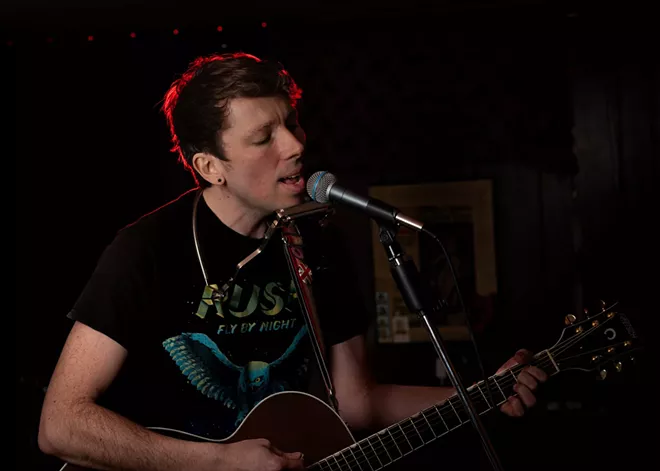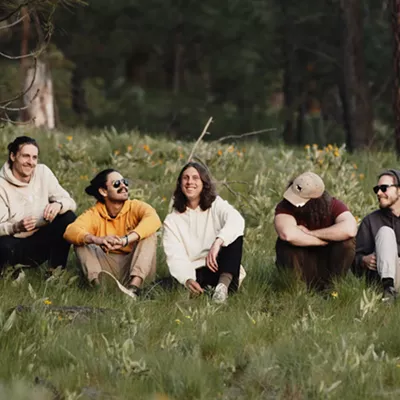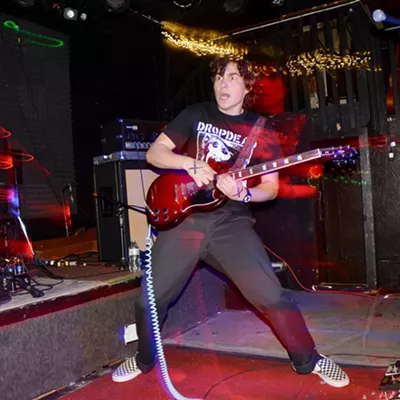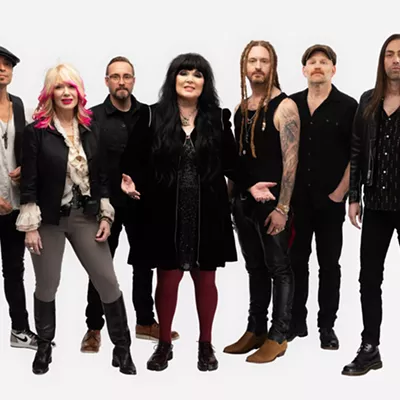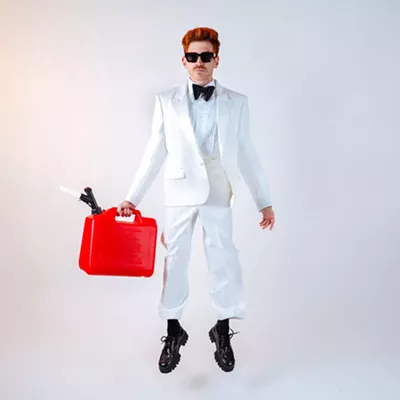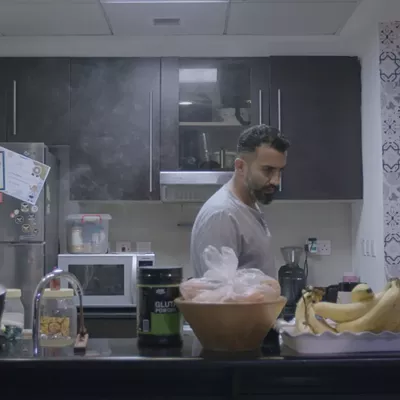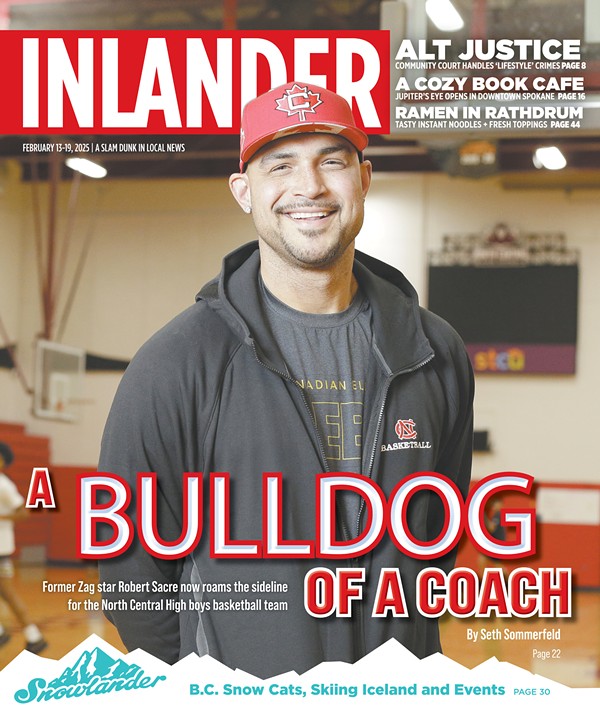The archetype of a swaggering, braggadocious, borderline-obnoxious rock star has been embedded in our cultural DNA since what's now considered classic rock was the cool new loud sound. But the Spokanite who makes music that often feels most in touch with the classic rock spirit also feels like the polar opposite of the rock star mythos.
Matthew Joseph Hughes is a soft-spoken soul almost to the point of coming across as bashful. The tender-hearted troubadour has been a local standout for years, garnering the most attention while fronting the group Atari Ferrari (Inlander readers' choice for Best Band in 2023), while also creating well over a dozen albums for his solo project Automatic Shoes (Inlander readers' choice for Best Singer-Songwriter in 2023).
While Atari Ferrari was long Hughes' primary concern, the band retreated a bit from the local stages in recent years in part because of burnout from playing so much locally. Things started to shift further a few years ago when Atari Ferrari's bassist moved away, and Hughes began to rethink the songs he'd been compiling.
"Basically, since pre-COVID, almost all of my writings were sketches of what would possibly be Atari Ferrari stuff. And then I kind of realized, maybe none of these are going to turn into Atari Ferrari songs, and I have to find out what they sound like on my own again," Hughes says. "It's kind of weird to be in a band, and then go back to trying to figure out what you sound like on your own."
While Atari Ferrari boasts a bigger energetic rock sound, left to his own devices, Hughes tends to favor more contemplative slow burns — closer to singer-songwriters like Aimee Mann than something you'd hear on classic rock radio. While he didn't consciously differentiate which songs were Atari Ferrari tracks and which were Automatic Shoes songs, there was a slight pressure to keep his bandmates happy.
"If I wrote a song I liked, I was like, 'Oh, I hope the band wants to play this,'" he says. "I realized some of the guys are gonna be like, 'Can we get a rock song?' They're not going to follow me into every depressing ballad I want to play. [Laughs] But I think that is pretty much where I exist most of the time."
Hughes' explorations in that melancholy realm can be heard across Automatic Shoes' new album Remember When We Were All Lovers, which dropped last September. Home recorded over the course of years with Hughes playing every part, the 12-song collection offers up an inviting mix of genres and styles while still feeling cohesive throughout.
Hughes has a knack for synthesizing his influences across the record without ever sounding like he's trying to derivatively parrot the past. There's an overarching dream folk feel to the proceedings, with certain moments evoking singer-songwriters like Sufjan Stevens and Bob Dylan. He also dips into classic rock ("23 Guru"), groovy pop rock ("Desire") and even Donovan-esque madrigal territories ("Legend").
"I'm gonna say [the album is] a melting pot," Hughes says. "I was definitely thinking about Bob Dylan a lot. Like [when writing] 'Desire,' even though 'Desire' sounds nothing like Dylan. With 'This Car,' I was thinking a little about Taylor Swift. 'Who I Was' was me trying to write an Al Stewart song, but I don't think it sounds like that. The Black Sabbath one I'm like, 'Okay, I'm going to do this song, but what if Beach House did it.'"
Starting the album during COVID times — "This Car" and the aforementioned invitingly warm cover of Black Sabbath's "Changes" were pandemic projects — gave Hughes more time than usual to reimagine the songs once their cores were written.
"It was a lot more patient than I have been before," Hughes says. "Usually I write a song, record it within a couple of days, and usually the first take or maybe second take is the one. But this one I really spent a lot more time with, seeing how different versions of the song would sound and which one would come out the best. And if I wasn't feeling it, I'd even come back to it a couple weeks later, which I had never really done before."
Thematically, Remember When We Were All Lovers offers up introspective songwriting that wrestles with love and being a musician in a manner that's both kind-hearted and unafraid of being self-critical.
"There is a running theme of performing — whether you're performing in a relationship or musically for people," Hughes says. "Like 'After the Show' and 'Show Up' kind of go together. That also brings in the idea of authenticity, which runs through [the album]. Trying to figure out how to be your authentic self, as well as a performer. And sometimes the lines can get a little blurry. Do I try and maintain the mystique in my personal relationship or do I let this person in? Do they even care about the rock star kind of bullshit? So I think that runs through a lot of the songs."
Hughes also made the album art for Remember When We Were All Lovers, a golden portrait of a beloved feline. There are layers to the path that led to this LP cover tribute, too.
"My cat Bowman is the album cover art," Hughes says. "The day after Bowman died, I went to the Goodwill bin, and there was a book on top of everything called P.S. Your Cat is Dead. And it's the story of this guy who ties up this home invader, and he's going to interrogate him, and then they end up falling in love through this interrogation. It's a really weird book, but they bond over this made-up novel called Remember When We Were All Lovers?. And it doesn't exist in real life, but that's when I clicked in my head, 'Oh, there's the album title.' And on the center label of the vinyl, there's a cat with a bow and arrow, like she's Cupid. That tied the whole theme together for me."
With a new album ready, the slightly hermitic Hughes decided he should probably book an Automatic Shoes gig. He set up a date at J Bones Musicland for a sort of unofficial delayed album release show alongside fellow Spokanites Karli Fairbanks and Timeworm. Since Hughes has often found playing solo shows dissatisfying, this time around he's not doing Automatic Shoes all on his own, enlisting his Atari Ferrari bandmates to back him up.
"This is like Automatic Shoes with the full band, which I don't think that's ever happened before," says Hughes, who jokes he's looking forward to not having to project his voice over rock drums. "It's exciting, because I have played Automatic Shoes solo before, but it never really sounds the way I want it to. It's just been me and a guitar, and it doesn't have all the little elements that I get to put on top of it at home. And I didn't want to be one of those loopy pedal [performers]."
For now, Hughes seems perfectly content to have music no longer feel like a grind. Automatic Shoes and Atari Ferrari might pop up for a show here and there when asked, but there's a contentment that can be heard in his voice when talking about it. When asked if he's just done with that whole hustle, he laughs with a zen-like calm.
"I'm not hustling for anything." ♦
Karli Fairbanks, Automatic Shoes, Timeworm • Sat, Jan. 25 at 7 pm • $16-$20 • All ages • J Bones Musicland • 2204 E. Mallon Ave. • theautomaticshoes.com

